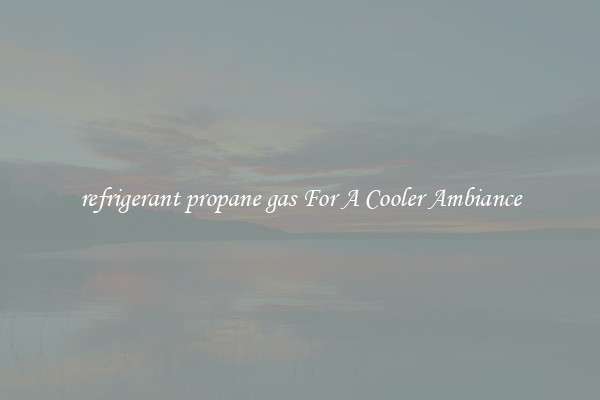refrigerant propane gas For A Cooler Ambiance
Refrigerant propane gas is becoming a popular choice for cooling systems in various applications due to its efficiency and environmentally friendly nature. With concerns over the impact of traditional refrigerants on the environment, more and more companies are turning to propane gas as a more sustainable option for creating a cooler ambiance.

Propane gas, also known as R-290, is a hydrocarbon refrigerant that is non-toxic, non-corrosive, and has low global warming potential. These qualities make it a preferred refrigerant for those looking to reduce their carbon footprint and comply with regulations aimed at reducing greenhouse gas emissions.
One of the key benefits of using propane gas as a refrigerant is its high thermodynamic performance. Propane has excellent heat transfer properties, which means it can efficiently absorb and release heat to create a cooler environment. This makes it an ideal choice for refrigeration and air conditioning systems in residential, commercial, and industrial settings.
In addition to its performance benefits, propane gas is also a cost-effective option for cooling systems. As a natural refrigerant, propane is readily available and affordable, making it a more economical choice compared to some synthetic refrigerants. This makes it an attractive option for businesses looking to maximize energy efficiency and reduce operating costs.
Furthermore, using propane gas as a refrigerant can also improve the overall safety of cooling systems. Propane is non-flammable at low concentrations, reducing the risk of fire hazards in the event of a leak. It is also easy to handle and install, making it a practical choice for a wide range of cooling applications.
Overall, refrigerant propane gas offers a sustainable and efficient solution for creating a cooler ambiance in various settings. Its high thermodynamic performance, cost-effectiveness, and safety benefits make it an attractive alternative to traditional refrigerants. As businesses and consumers become more environmentally conscious, the demand for propane gas as a refrigerant is likely to continue to grow, leading to a cooler and greener future for all.

View details

View details

View details

View details





